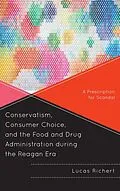In the last quarter of the 20th century, politicians in Washington, as well as interest groups, regulatory policy makers, and drug industry leaders were forced to confront the hot-button issue of pharmaceutical regulation. The struggle always centered on product innovation, consumer protection, and choice in the free market. As the American economy stuttered in the late 1970s, the stakes were extremely high for the powerful drug industry and the American public. At the center of this drama was the Food and Drug Administration, which was censured from both the left and right of the political spectrum for being too strict and too lenient in the application of its regulatory powers.
Lucas Richert explores the FDA, drugs, and politics in the context of the watershed Reagan era, a period when the rhetoric of limited government, reduced regulation, and enhanced cooperation between businesses and U.S. regulatory agencies was on the ascent.As he investigates the controversies surrounding Laetrile, Reye's Syndrome, Oraflex, patient package inserts, diet pills, and HIV/AIDS drugs, Richert argues that the practical application of conservative economic principles to the American drug industry was A Prescription for Scandal.
Autorentext
Lucas Richert is a postdoctoral fellow at the University of Saskatchewan.
Zusammenfassung
In the last quarter of the 20th century, politicians in Washington, as well as interest groups, regulatory policy makers, and drug industry leaders were forced to confront the hot-button issue of pharmaceutical regulation. The struggle always centered on product innovation, consumer protection, and choice in the free market. As the American economy stuttered in the late 1970s, the stakes were extremely high for the powerful drug industry and the American public. At the center of this drama was the Food and Drug Administration, which was censured from both the left and right of the political spectrum for being too strict and too lenient in the application of its regulatory powers.
Lucas Richert explores the FDA, drugs, and politics in the context of the watershed Reagan era, a period when the rhetoric of limited government, reduced regulation, and enhanced cooperation between businesses and U.S. regulatory agencies was on the ascent. As he investigates the controversies surrounding Laetrile, Reye's Syndrome, Oraflex, patient package inserts, diet pills, and HIV/AIDS drugs, Richert argues that the practical application of conservative economic principles to the American drug industry was A Prescription for Scandal.
Inhalt
CONTENTS
ACKNOWLEDGEMENTS
INTRODUCTION
THE FDA IN THE POLITICAL AND REGULATORY ORDER, 1906-PRESENT (1)
DISENCHANTMENT AND DRUG REGULATION DURING THE SEVENTIES (2)
CARTER AND THE FDA (3)
OPENING MOVES: REAGAN AND THE FDA, 1980-82 (4)
THE CONTINUING EVOLUTION OF THE FDA, 1983-1984 (5)
REAGAN'S LEADERSHIP, HEALTH ACTIVISM, AND THE HIV/AIDS CRISIS (6)
THE TRIUMPH OF CONSERVATISM: SCANDAL AND BEYOND (7)
CONCLUSION (8)
NOTES
BIBLIOGRAPHY
APPENDICES
